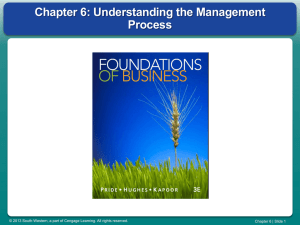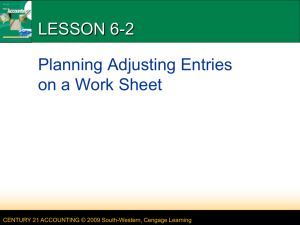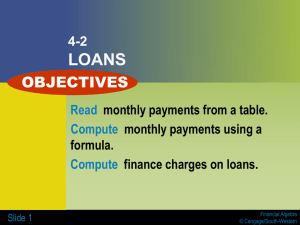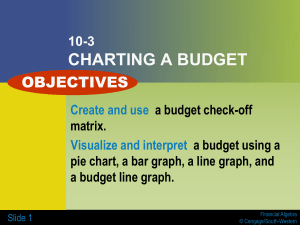Financial Algebra
advertisement
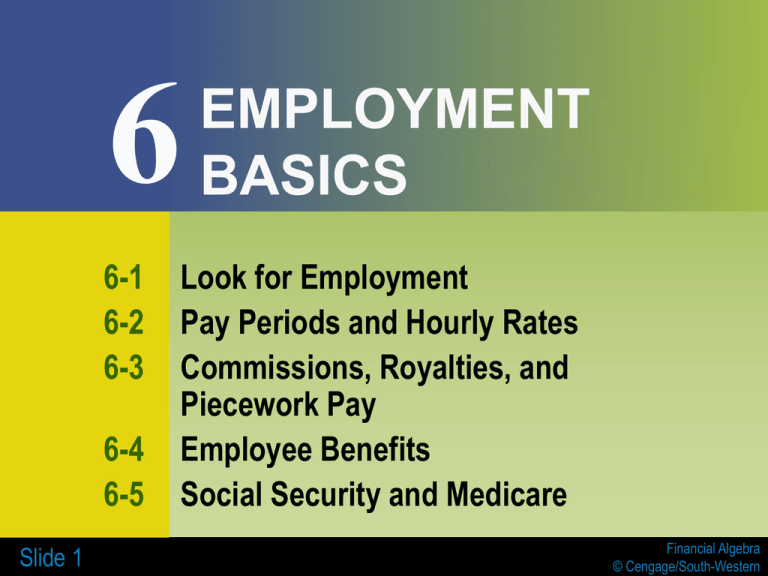
6 6-1 6-2 6-3 6-4 6-5 Slide 1 EMPLOYMENT BASICS Look for Employment Pay Periods and Hourly Rates Commissions, Royalties, and Piecework Pay Employee Benefits Social Security and Medicare Financial Algebra © Cengage/South-Western 6-1 LOOK FOR EMPLOYMENT OBJECTIVES Compute periodic salary based on annual contract salary. Interpret abbreviations in classified ads. Express classified ad prices as piecewise functions. Slide 2 Financial Algebra © Cengage/South-Western Key Terms employment agency fee paid resume Form W-4 Employee’s Withholding Allowance Certificate benefits discount Slide 3 Financial Algebra © Cengage Learning/South-Western How do people in different stages of their careers find employment? Does anyone currently have a job or did you have a job over the summer? How did you find your job? Slide 4 Financial Algebra © Cengage Learning/South-Western Example 1 Julianne found a job listed in the classified ads that pays a yearly salary of $41K. What is the weekly salary based on this annual salary? Slide 5 Financial Algebra © Cengage Learning/South-Western CHECK YOUR UNDERSTANDING Karen found a job with an annual salary of $67.3K. What is her monthly pay, rounded to the nearest dollar? Slide 6 Financial Algebra © Cengage Learning/South-Western Example 2 Dylan took a job through an employment agency. The job pays $395 per week. Dylan must pay a fee to the employment agency. The fee is 20% of his first four weeks’ pay. How much money must Dylan pay the agency? Slide 7 Financial Algebra © Cengage Learning/South-Western CHECK YOUR UNDERSTANDING The Alpha Employment Agency is advertising a job in the construction industry. The fee is 15% of the first month’s pay. If the job pays x dollars annually, express the agency fee algebraically. Slide 8 Financial Algebra © Cengage Learning/South-Western EXAMPLE 3 Ken is a mechanic who owns Ace Auto Repair. He needs a foreign car expert and is placing a twelve-line classified ad. The cost of an ad x lines long is given by the following piecewise function. c(x) = 56 when x ≤ 4 56 + 6(x − 4) when x > 4 Find the cost of a twelve-line ad. Slide 9 Financial Algebra © Cengage Learning/South-Western CHECK YOUR UNDERSTANDING A local newspaper charges $13 for each of the first four lines of a classified ad, and $7.50 for each additional line. Express the cost of an x-line ad, c(x), as a piecewise function. Slide 10 Financial Algebra © Cengage Learning/South-Western EXTEND YOUR UNDERSTANDING If the local newspaper from the Check Your Understanding above wanted the price of their per line charge for the first four lines to be k, what would change in the piecewise function? Slide 11 Financial Algebra © Cengage Learning/South-Western EXAMPLE 4 An online job search site charges employers fees to post job listings. Their price list is shown in the table. The prices per posting decrease as the number of postings increase. What is the percent savings if an employer decides to post four jobs? Slide 12 Financial Algebra © Cengage Learning/South-Western CHECK YOUR UNDERSTANDING JobFind charges employers x dollars to post a job on their website. They offer a 16% discount if 20 or more jobs are posted. If 31 jobs are posted by a specific employer, express the discount as a percent. Slide 13 Financial Algebra © Cengage Learning/South-Western EXAMPLE 5 Jane’s Printing Services charges $29.95 to print 200 high quality copies of a one-page resume. Each additional set of 100 copies costs $14. Express the cost, r(x), of printing x sets of 100 resumes, as a piecewise function. Slide 14 Financial Algebra © Cengage Learning/South-Western CHECK YOUR UNDERSTANDING Pete needs 77 copies of his resume. Jane’s charges 39 cents per resume-quality copy. Should he pay individually for the 77 copies or get 100 copies at the prices from Example 5? Explain. Slide 15 Financial Algebra © Cengage Learning/South-Western EXTEND YOUR UNDERSTANDING Write an inequality that compares the unit costs of a resume printed using each option Pete has in the Check Your Understanding above. Slide 16 Financial Algebra © Cengage Learning/South-Western 6-2 PAY PERIODS AND HOURLY RATES OBJECTIVES Compute weekly, semimonthly, and biweekly earnings given annual salary. Compute hourly pay and overtime pay given an hourly rate. Slide 17 Financial Algebra © Cengage/South-Western Key Terms Slide 18 weekly biweekly semimonthly monthly direct deposit hourly rate regular hours overtime hours overtime hourly rate time-and-a-half overtime double-time pay gross pay minimum wage Financial Algebra © Cengage Learning/South-Western What do you need to know to make sure each paycheck is correct? What is the difference between semimonthly and biweekly pay periods? What are the advantages of direct deposit? Describe any Department of Labor postings that have been posted in your workplace. Slide 19 Financial Algebra © Cengage Learning/South-Western Example 1 Christina is paid biweekly. Her annual salary is $37,000. What is her biweekly salary, rounded to the nearest cent? Slide 20 Financial Algebra © Cengage Learning/South-Western CHECK YOUR UNDERSTANDING Carlos earns x dollars biweekly. Express his annual salary algebraically. Slide 21 Financial Algebra © Cengage Learning/South-Western Example 2 Manny is paid semimonthly. His semimonthly salary is $1,239. What is his annual salary? Slide 22 Financial Algebra © Cengage Learning/South-Western CHECK YOUR UNDERSTANDING Alex is paid semimonthly. His annual salary is y dollars. Express his semimonthly salary algebraically. Slide 23 Financial Algebra © Cengage Learning/South-Western EXAMPLE 3 Maureen works at a local Chicken King restaurant. Her regular hourly wage is $9.70. If she regularly works 40 hours per week, what is her regular weekly pay? Slide 24 Financial Algebra © Cengage Learning/South-Western CHECK YOUR UNDERSTANDING Roger regularly works h hours per week at a rate of d dollars per hour. Express his annual salary algebraically. Slide 25 Financial Algebra © Cengage Learning/South-Western EXAMPLE 4 If Maureen from Example 3 works overtime, she receives an hourly rate of 1½ times her regular hourly rate. What is Maureen’s hourly overtime rate? Slide 26 Financial Algebra © Cengage Learning/South-Western CHECK YOUR UNDERSTANDING If Mary Ann earns y dollars per hour regularly, express her hourly overtime rate algebraically if she is paid time-and-a-half. Slide 27 Financial Algebra © Cengage Learning/South-Western EXAMPLE 5 Janice earns $10 per hour. If her regular hours are 40 hours per week, and she receives time-and-ahalf overtime, find her total pay for a week in which she works 45 hours. Slide 28 Financial Algebra © Cengage Learning/South-Western CHECK YOUR UNDERSTANDING Ron regularly works 40 hours per week, at a rate of x dollars per hour. Last week he worked y overtime hours at time-and-a-half. Express his total weekly salary algebraically. Slide 29 Financial Algebra © Cengage Learning/South-Western EXAMPLE 6 Samantha worked her 40 regular hours last week, plus 7 overtime hours at the time-and-a-half rate. Her gross pay was $611.05. What was her hourly rate? Slide 30 Financial Algebra © Cengage Learning/South-Western CHECK YOUR UNDERSTANDING Jillian worked her 40 regular hours last week, plus 2 overtime hours at a double-time rate. Her gross pay was $484. What was her hourly rate? Slide 31 Financial Algebra © Cengage Learning/South-Western EXAMPLE 7 Last week, Saul worked r regular hours and t overtime hours at a time and-a-half rate. He earned $700. If x represents his hourly rate, express x in terms of r and h. Slide 32 Financial Algebra © Cengage Learning/South-Western CHECK YOUR UNDERSTANDING Jonathan worked h hours at an hourly rate of r dollars. He also worked w hours at an overtime rate of double time. Express his total pay for the week algebraically. Slide 33 Financial Algebra © Cengage Learning/South-Western EXTEND YOUR UNDERSTANDING Jovanna gets paid a regular-pay rate of r dollars for 40 hours worked. She is paid at a time-and-a-half rate for up to 16 overtime hours worked and a double-time rate for any overtime hours worked greater than 16 hours. Write a piecewise function, p(z), for Jovanna’s pay when she works z hours. Slide 34 Financial Algebra © Cengage Learning/South-Western 6-3 COMMISSIONS, ROYALTIES, AND PIECEWORK PAY OBJECTIVES Compute pay based on percent commission. Compute piecework pay. Understand advantages and disadvantages of pay based on production. Slide 35 Financial Algebra © Cengage/South-Western Key Terms Slide 36 commission royalty pieceworker piecework rate Financial Algebra © Cengage Learning/South-Western What jobs base their pay according to the amount produced? What are the advantages and disadvantages of each of the following types of payment? Commissions Royalties Payments based on the amount of sales Payments based on production Slide 37 Financial Algebra © Cengage Learning/South-Western Example 1 Adrianna wrote a textbook for high school students. She receives a 10% royalty based on the total sales of the book. The book sells for $47.95, and 17,000 copies were sold last year. How much did Adrianna receive in royalty payments for last year? Slide 38 Financial Algebra © Cengage Learning/South-Western CHECK YOUR UNDERSTANDING Xander writes math textbooks that sell for x dollars each. He received a bonus of $2,500 for signing a contract, and he receives 8% commission on each book sale. Express the total amount of income Xander earns from selling y books algebraically. Slide 39 Financial Algebra © Cengage Learning/South-Western Example 2 Allison sells cosmetics part-time from door-to-door. She is paid a monthly commission. She receives 11% of her first $900 in sales and 17% of the balance of her sales. Last month she sold $1,250 worth of cosmetics. How much commission did she earn last month? Slide 40 Financial Algebra © Cengage Learning/South-Western CHECK YOUR UNDERSTANDING Arthur sells electronics on commission. He receives 7% of his first x dollars in sales and 10% of the balance of his sales. Last week he sold y dollars worth of electronics. Express the commission he earned last month algebraically. Slide 41 Financial Algebra © Cengage Learning/South-Western EXAMPLE 3 Kate works in a dress factory that makes dresses for designer boutiques. She is paid a piecework rate of $85 per unit (piece) produced. Yesterday she made 3 dresses. How much did she earn? Slide 42 Financial Algebra © Cengage Learning/South-Western CHECK YOUR UNDERSTANDING Martin writes magazine articles. He is paid a rate of p dollars for each article he writes. Last year he wrote s articles. Express his total piecework earnings algebraically. Slide 43 Financial Algebra © Cengage Learning/South-Western EXAMPLE 4 Tony picks strawberries and gets paid at a piecework rate of 45 cents per container for the first 200 containers picked. He receives 65 cents per container for every container over 200 that he picks. Last week, Tony picked 270 containers. How much did he earn? Slide 44 Financial Algebra © Cengage Learning/South-Western CHECK YOUR UNDERSTANDING Brianna picks tomatoes on a local farm. She receives 11 cents per crate. Last week, her total piecework earnings was x dollars. Express the number of crates she picked algebraically. Slide 45 Financial Algebra © Cengage Learning/South-Western EXAMPLE 5 Glassman Chevrolet pays commission to its car salespeople. They are paid a percent of the profit the dealership makes on the car, not on the selling price of the car. If the profit is under $750, the commission rate is 20%. If the profit is at least $750 and less than or equal to $1,000, the commission rate is 22% of the profit. If the profit is above $1,000,the rate is 25% of the profit. If x represents the profit, express the commission c(x) as a piecewise function. Slide 46 Financial Algebra © Cengage Learning/South-Western CHECK YOUR UNDERSTANDING Find the difference between the commission paid if a Glassman Chevrolet salesman, from Example 5, sells a car for a $750 profit compared to selling a car for a $749 profit. Slide 47 Financial Algebra © Cengage Learning/South-Western EXAMPLE 6 Joyce works at Fortunato’s Furniture. She is paid on commission. She receives 10% of her first $900 in sales and 15% of the balance of her sales. Last week she earned $750. What was the total value of the furniture she sold? Slide 48 Financial Algebra © Cengage Learning/South-Western CHECK YOUR UNDERSTANDING Lauren is a salesperson at Koslow’s Tires. She is paid a monthly commission. She receives 6% of her first $1,000 in sales and 11% of the balance of her sales. Today she earned $203. What was the total value of the tires she sold? Slide 49 Financial Algebra © Cengage Learning/South-Western 6-4 EMPLOYEE BENEFITS OBJECTIVES Understand and calculate the value of certain employee benefits. Slide 50 Financial Algebra © Cengage/South-Western Key Terms Slide 51 employee benefits insurance paid vacation time paid holiday time retirement plans stock ownership plans childcare leave family health care individual health care pension unemployment insurance base period worker’s compensation Financial Algebra © Cengage Learning/South-Western What are the benefits of a job? List some job benefits. What job benefits may be unique to salaried workers? Are there any requirements that a person who is collecting unemployment insurance must fulfill? Slide 52 Financial Algebra © Cengage Learning/South-Western Example 1 Alan works for a printing company. It has been a little over four years since he was hired. He now makes $54,080 per year. When he was hired, he was told that he had five days of paid vacation time. For each year that he worked at the company, he would gain another two days of paid vacation time to a maximum of 20 days. How many paid vacation days does he now get at the end of four years of employment and how much will he make during the time he is on vacation? Slide 53 Financial Algebra © Cengage Learning/South-Western CHECK YOUR UNDERSTANDING Let x represent the number of the working year and y represent the number of paid vacation days. Based on the table above, write an algebraic equation that models the relationship between these two variables. Slide 54 Financial Algebra © Cengage Learning/South-Western Example 2 Frieda’s employer offers her family health care. Frieda must contribute 12% of the cost, and her employer will cover the rest. Frieda gets paid on a biweekly basis, and she notices that $88.50 is taken out of each paycheck for her portion of the contribution to the family health care coverage. How much does Frieda’s employer contribute for her coverage? Slide 55 Financial Algebra © Cengage Learning/South-Western CHECK YOUR UNDERSTANDING Mark’s employer offers individual health care. Mark pays d dollars out of his biweekly paycheck for his share of the total cost. If Mark’s contribution is a percentage of the total cost, where p represents that percentage written as an equivalent decimal, represent the total cost of Mark’s coverage in terms of d and p. Slide 56 Financial Algebra © Cengage Learning/South-Western EXAMPLE 3 Marina works at Washington Performing Arts Center. Her employer offers her a pension. Marina’s employer uses a formula to calculate the pension. A retiring employee will receive 1.5% of their average salary for the last five years of employment for every year worked. Marina is planning on retiring at the end of this year after 25 years of employment. Marina would receive this amount each year until her death. Her salaries for the last five years are $88,900, $92,200, $96,000, $98,000, and $102,000. Calculate Marina’s pension. Slide 57 Financial Algebra © Cengage Learning/South-Western CHECK YOUR UNDERSTANDING DeBrown Corporation offers employees a retirement plan based upon the following formula. The retiree will get 2% of the average of the final three year salaries times the number of years employed by the company. Suppose an employee’s last three years of salaries are A, B, and C, and the employee worked at DeBrown for D years. Write the algebraic expression that represents the employee’s yearly pension. Slide 58 Financial Algebra © Cengage Learning/South-Western EXAMPLE 4 In Reese’s state, the weekly unemployment compensation is 60% of the 26-week average for the two highest-salaried quarters. A quarter is three consecutive months. For July, August, and September, he earned a total of $9,024. In October, November, and December, he earned a total of $9,800. Determine Reese’s unemployment compensation. Slide 59 Financial Algebra © Cengage Learning/South-Western CHECK YOUR UNDERSTANDING Wanda lives in the same state as Reese. Her weekly unemployment compensation is $360. What were the total 26-week earnings for her highest two consecutive quarters of employment? Slide 60 Financial Algebra © Cengage Learning/South-Western EXTEND YOUR UNDERSTANDING Lara lives in the same state as Reese. Lara made the same weekly salary for each of the 26 weeks in her two highest consecutive quarters. She will receive a weekly unemployment compensation check for $570. What was Lara’s weekly salary when she worked for her company? Slide 61 Financial Algebra © Cengage Learning/South-Western 6-5 SOCIAL SECURITY AND MEDICARE OBJECTIVES To compute paycheck deductions for Social Security. To compute paycheck deductions for Medicare. Slide 62 Financial Algebra © Cengage/South-Western Key Terms Social Security Federal Insurance Contributions Act (FICA) FICA tax Social Security tax Medicare tax maximum taxable income Social Security number Slide 63 Financial Algebra © Cengage Learning/South-Western What are Social Security and Medicare? Did you ever notice a FICA box on your paycheck stub? Employers match employee contributions to Social Security and Medicare. What are these matching funds used for? Slide 64 Financial Algebra © Cengage Learning/South-Western Example 1 Ramiro got his first job in 2006. In that year, Social Security tax was 6.2% of income up to $94,200. Medicare tax was 1.45%. If Ramiro earned $73,210 in 2006, how much did he pay for Social Security and Medicare taxes? Slide 65 Financial Algebra © Cengage Learning/South-Western CHECK YOUR UNDERSTANDING Lisa made a total of x dollars last year, which was less than the maximum taxable income for the year. Social Security tax was 6.2% and Medicare tax was 1.45%. Write an expression that represents what Lisa paid to Social Security and Medicare combined. Slide 66 Financial Algebra © Cengage Learning/South-Western Example 2 Express the Social Security tax for 2006 as a piecewise function. Slide 67 Financial Algebra © Cengage Learning/South-Western CHECK YOUR UNDERSTANDING Ming worked three jobs in 2006. The total of her incomes was less than $94,200. At QuickMart, she made x dollars. At the College Book Store, she made y dollars. At the Mail Depot, she made z dollars. Express the combined total of her Social Security and Medicare taxes algebraically. Slide 68 Financial Algebra © Cengage Learning/South-Western EXAMPLE 3 Graph the Social Security tax piecewise function from Example 2. Slide 69 Financial Algebra © Cengage Learning/South-Western CHECK YOUR UNDERSTANDING Mark’s Social Security tax was $3,500 during the year in the graph in Example 3. Use the graph to approximate his taxable income. Slide 70 Financial Algebra © Cengage Learning/South-Western EXAMPLE 4 In 1988, Social Security tax was 7.51%, to the maximum income of $45,000. If Grace earned $51,211 in 1988, how much Social Security did she pay? Slide 71 Financial Algebra © Cengage Learning/South-Western CHECK YOUR UNDERSTANDING In 1988 Ramona paid $2,853.80 in Social Security tax. What was Ramona’s taxable income in 1988? Slide 72 Financial Algebra © Cengage Learning/South-Western
